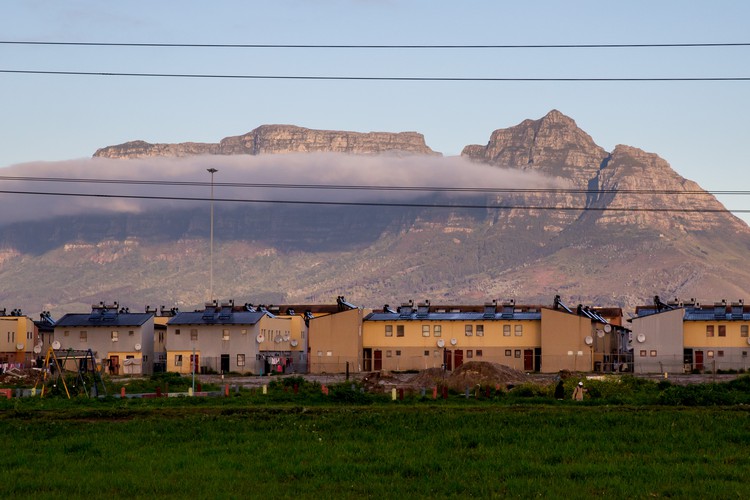
10 October 2024
RDP houses in Langa, Cape Town. Archive photo: Ashraf Hendricks
Manenberg resident Bennita Koff lives in a backyard structure. She applied for state housing almost 20 years ago. Now, she’s getting evicted.
On 19 August, she received notice to vacate her residence by 30 September. This was later extended to 30 October.
“I don’t know where to go. I don’t know what to do,” says Koff.
Koff says the stress has affected her blood pressure and her doctor has warned that she is at risk of having a stroke.
Koff pays rent of R500 per month, about the same amount as the child support grant she gets for one of her grandchildren. She used to live in her one-room backyard structure with seven children and grandchildren, but part of the roof caved in during winter, forcing some of her family to move out and live with relatives.
Koff is one of more than 340,000 Capetonians who have applied for a government house and have not yet received one.
The City provides useful statistics for Manenberg. Approximately 70% of all state provided homes in Manenberg have backyard tenants. There were 11,768 applications registered on the Housing Needs Register as at 9 October 2024 from Manenberg. These include:
Koff has enquired about her housing application repeatedly at the City’s housing office on Wale Street, but she said the last time she went – a few years ago – the housing officials could not provide her with any updates.
“They say, there’s still nothing for me,” says Koff.
Priority is given by the year of application, according to Human Settlements Councillor Carl Pophaim. People get off the waiting list by qualifying for various types of housing projects. As soon as someone qualifies, they are notified and move on with the necessary approvals.
However, even people who have been approved have not received their allocated home. Jillian Mtshayi applied in 1993, was approved for a house in 2009, and allocated one in 2014 in the Hague/Roosendal development in Delft.
She attended a mandatory beneficiary workshop in April 2014, but in the end did not receive her house. The City told her that Delft houses were for Delft residents only, she says, and her application was removed.
She then reapplied and was approved for a house in 2016 in Eerste River. But this was later denied, because she was told she “already had a house” in Delft.
“Now I must drink this tablet – a stress and depression pill,” Mtshayi said. “I don’t need a tablet. I need a place in the house I applied for.”
Pophaim said he could not understand how this happened to Mtshayi and invited her to contact him. She said she did so on 11 September, but he has yet to respond.
Brenda Solomons applied for housing in 1999. In 2021, she was finally approved for a house in the Beacon Valley development in Mitchells Plain. But the project was cancelled in 2022 due to extortion, and she has not been given a home in any other development.
“The excitement is just taken away in a split second,” Solomons said. “It’s like somebody poured cold, icy water over you. Because where to go now, what to do?”
Clive Maart applied for housing in 1991 and had sporadic communication with the City housing officials. But he has been told, he says, he is ineligible because his wife has a house in her name from her late husband.
But his wife has no access to this house, and it has not been transferred to her name. The housing office said he would need to divorce her and apply for a house of his own. But he refuses to do his as it is against his religion.
Manenberg Ward Councillor Mogamat Cassiem said the City’s housing budget relies on funding from the national treasury, which he said makes it difficult to build the number of houses that are actually needed.
“Our vision is to see that people are given that basic decency and the dignity of having a home. The challenge is that we’re always restricted by budgets.”
Approximately 340,000 applicants are reflected as “awaiting a housing opportunity” on the City’s Housing Needs Register.
The City of Cape Town says its human settlements budget is about R7.6-billion over three years. It is focusing on public housing upgrades, affordable housing in well-located areas, subsidy housing, transferring City rental units to tenants and the upgrading of informal settlements.
There is a strategy “to accelerate delivery especially for those earning between R3,500 and R22,000 per month”, said Pophaim.
Pophaim said that the Accelerated Land Release Programme, a mayoral priority, is providing about 10,000 units. “This is besides the national Breaking New Ground housing, informal settlement and backyarder upgrades, land reform through title deeds and upgrading of the public housing units.”
“The City estimates that 100,000 social housing opportunities are possible at sites such as Wingfield, Youngsfield, Ysterplaat and the Parliamentary village. The release of these national mega-properties for housing would make a huge difference given the sheer scale of the well-located military land compared to the very limited land with housing potential owned.”
Pophaim said Cape Town faces a shortage of land and high land prices. “But funding is starting to become an even bigger concern following general national budget cuts over the years,” said Pophaim.